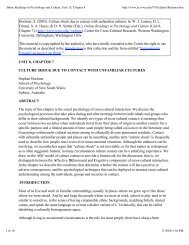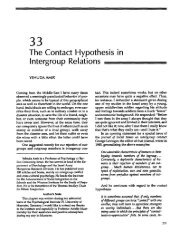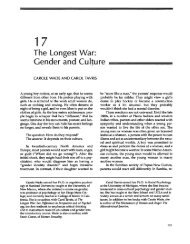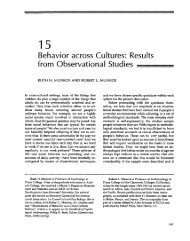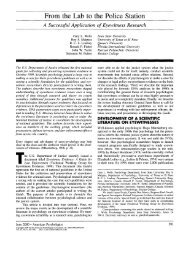Malpass - Eyewitness Identification Lab
Malpass - Eyewitness Identification Lab
Malpass - Eyewitness Identification Lab
You also want an ePaper? Increase the reach of your titles
YUMPU automatically turns print PDFs into web optimized ePapers that Google loves.
6 Psychology and Law, Overview<br />
ENCYCLOPEDIA OF APPLIED PSYCHOLOGY - APSY 00380<br />
p0135<br />
p0140<br />
p0145<br />
the custody of one, both, or neither of the parents must<br />
be made by a court. One parent may be mentally ill, or<br />
there may be allegations of physical or emotional abuse<br />
or neglect by a parent; in such cases, the courts must<br />
determine whether that parent is unfit to raise the<br />
children. More frequently, courts must grapple with<br />
the question of which type of custodial arrangement<br />
will promote the child’s best interests.<br />
Psychologists who are well versed in the research on<br />
psychological effects on children of divorce and custodial<br />
arrangements can play a significant role in assisting<br />
courts with determinations about parental fitness.<br />
Family life has traditionally held a sacrosanct position<br />
within most legal systems. Over time, social and cultural<br />
factors regarding who has worked outside of the<br />
home and who has been a primary caregiver for a child<br />
have shifted the status and rights of children, women,<br />
mothers, and fathers. In recent years, definitions of the<br />
family have undergone a dramatic change, particularly<br />
regarding the nature of nuclear and extended families.<br />
About one-half of all Australian and North American<br />
children born in the 1990s will be raised by a solo<br />
parent, and many children have no siblings. The rise<br />
of ‘‘no fault’’ divorce laws has contributed to these<br />
changes and has removed much of the stigma previously<br />
associated with marital dissolution. However,<br />
in certain cultures, remaining married to a spouse who<br />
takes on a new partner provides more benefits and<br />
social advantages to the ousted wife and children<br />
than does the option of divorce.<br />
Along with changes to the definition of family, the<br />
concept of the psychological parent has developed.<br />
Accordingly, the rights of grandparents, step-parents,<br />
gay parents, and other domestic partnerships have<br />
influenced trends in custodial determinations. The extent<br />
to which children are consulted regarding their<br />
preferences, and the age at which this occurs, varies<br />
from one community to another.<br />
The contributions of and participation of psychologists<br />
as researchers and practitioners in issues relating<br />
to marriage, divorce, and child custody have been<br />
welcomed by legal practitioners. Research has contributed<br />
to our understanding of circumstances that promote<br />
healthy adjustment in children, and can assist in<br />
assessing custodial options such as sole versus joint<br />
custody. Eight studies that compared children’s adjustment<br />
in intact families versus joint custodial arrangements<br />
showed no adjustment differences in the<br />
children. Data from 33 studies indicated that (1) no<br />
causal relationship has emerged between the type of<br />
custodial arrangements and children’s adjustment; (2)<br />
when the parents are in extreme conflict, children<br />
experience adjustment difficulties no matter what the<br />
custodial arrangement; (3) more parental conflict<br />
ensues between ex-partners when one parent retains<br />
sole custody than when custody is joint legal and<br />
physical; and (4) the ongoing involvement of the father<br />
with the child is predicted by the relationship between<br />
the parents, not by the relationship between the father<br />
and the child.<br />
3.3. Child Custody<br />
The article on child custody by Martinson and Gould<br />
traces the four major doctrines relied upon by courts in<br />
making custody decisions: (1) the ‘‘tender years’’ doctrine<br />
for children under the age of 7, favoring maternal<br />
custody; (2) the ‘‘psychological parent’’ rule, favoring<br />
the primary caregiver; (3) the ‘‘least detrimental alternative,’’<br />
favoring the stability and ongoing relationships<br />
in the child’s life; and (4) the ‘‘best interests of<br />
the child.’’ Although the latter is the prevailing standard,<br />
it has repeatedly been criticized as too vague,<br />
e.g., regarding the time frame to take into consideration<br />
when it is applied.<br />
This article also outlines the key features of ethical<br />
practice standards, such as the American Psychological<br />
Association Guidelines on Custody Evaluations<br />
(1994). These guidelines assume the legal criterion is<br />
the best interests of the child. In line with the distinction<br />
between functional and diagnostic criteria noted<br />
earlier, the guidelines emphasize that evaluators must<br />
avoid focusing on the psychopathology of parents<br />
except to the extent that it affects parenting skills and<br />
fitness. The guidelines echo the need to use multiple<br />
methods of data gathering, such as observations, interviews,<br />
contacting third parties or collaterals courses,<br />
obtaining school reports and records, as well as formal<br />
psychological assessments, in order to offer a more<br />
reliable recommendation to the courts.<br />
Because the stakes are high in custody disputes,<br />
practitioners are advised to take steps to uncover<br />
efforts by the parties undergoing evaluation to exaggerate<br />
positive information or minimize negative information.<br />
The principle of substantiating one’s opinion<br />
with evidence to back it up is critical to avoid recourse<br />
to clinical opinions that are more susceptible to attack.<br />
Many of the recommendations for successful forensic<br />
consultation in child custody cases can be applied to<br />
other areas of forensic practice.<br />
Commentators have pointed out that one consequence<br />
of the implementation of no fault divorce laws<br />
ELSEVIER PROOF<br />
s0030<br />
p0150<br />
p0155<br />
p0160<br />
p0165



